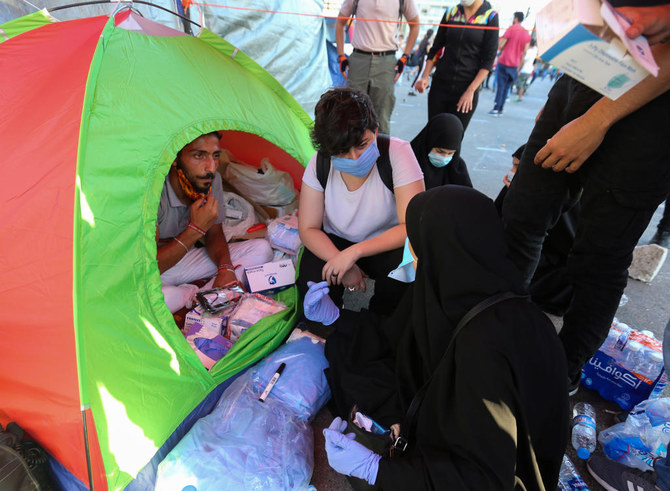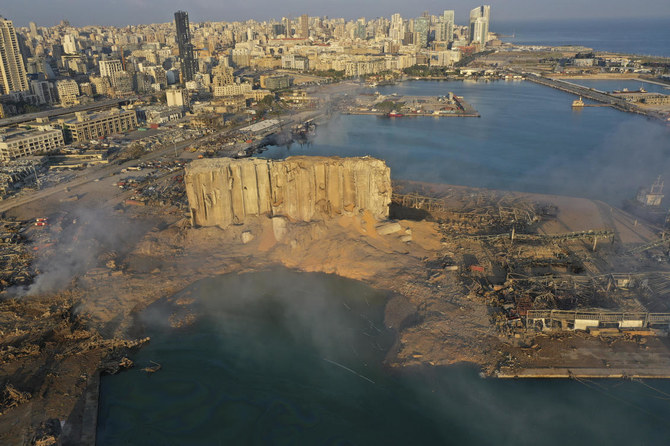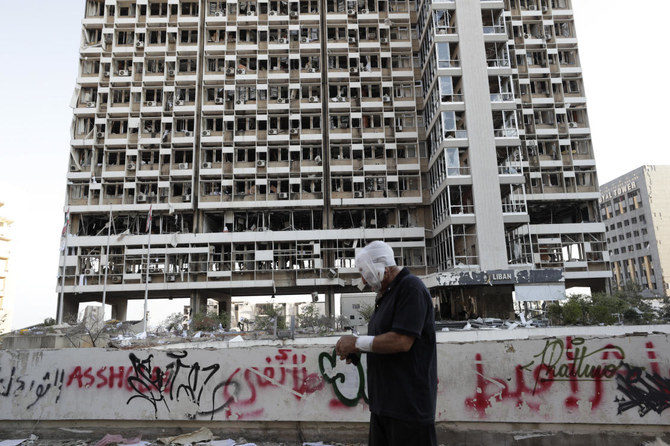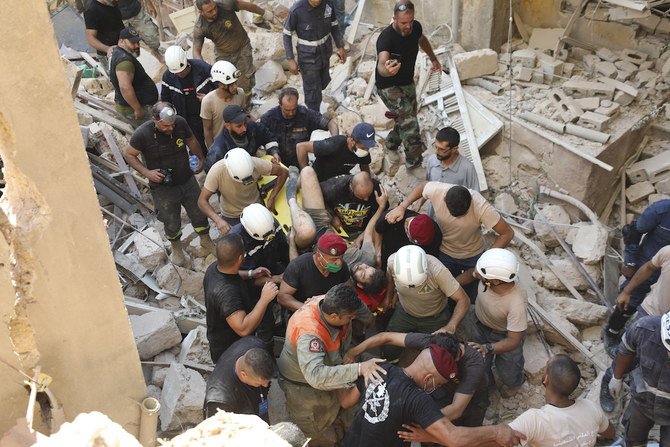BEIRUT: Lebanese rescue teams pulled out bodies and hunted for missing in the wreckage of buildings on Wednesday as investigations blamed negligence for a massive warehouse explosion that sent a devastating blast wave across Beirut, killing at least 135.
More than 5,000 people were injured in Tuesday’s explosion at Beirut port, Health Minister Hamad Hassan said, and up to 250,000 were left without homes fit to live in after shockwaves smashed building facades, sucked furniture out into streets and shattered windows miles inland.
Hassan said tens of people remained missing. Prime Minister Hassan Diab declared three days of mourning from Thursday.
The death toll was expected to rise from the blast, which officials blamed on a huge stockpile of highly explosive material stored for years in unsafe conditions at the port.
The explosion was the most powerful ever to rip through Beirut, a city still scarred by civil war that ended three decades ago and reeling from an economic meltdown and a surge in coronavirus infections. The blast rattled buildings on the Mediterranean island of Cyprus, about 100 miles (160 km) away.
#WATCH: One eyewitness managed to capture on video both explosions at #Beirut's port on Tuesday from a balcony near the blast site #BeirutExplosion #Lebanon https://t.co/vz4laWKtV3 pic.twitter.com/A8lQL3DUyu
— Arab News (@arabnews) August 5, 2020
President Michel Aoun said 2,750 tons of ammonium nitrate, used in fertilizers and bombs, had been stored for six years at the port without safety measures, after it was seized.
In an address to the nation during an emergency cabinet session, Aoun said: “No words can describe the horror that has hit Beirut last night, turning it into a disaster-stricken city.”
He said the government was “determined to investigate and expose what happened as soon as possible, to hold the responsible and the negligent accountable.”
An official source familiar with preliminary investigations blamed the incident on “inaction and negligence,” saying “nothing was done” by committees and judges involved in the matter to order the removal of hazardous material.
The cabinet ordered port officials involved in storing or guarding the material since 2014 to be put under house arrest, ministerial sources told Reuters. The cabinet also announced a two-week state of emergency in Beirut.
Ordinary Lebanese, who have lost jobs and watched savings evaporate in Lebanon’s financial crisis, blamed politicians who have overseen decades of state corruption and bad governance.
“This explosion seals the collapse of Lebanon. I really blame the ruling class,” said Hassan Zaiter, 32, a manager at the heavily damaged Le Gray Hotel in downtown Beirut.
The health minister said the death toll had climbed to 135, as the search for victims continued after shockwaves from the blast hurled some of the victims into the sea.
Relatives gathered at the cordon to Beirut port seeking information on those still missing. Many of those killed were port and custom employees, people working in the area or those driving nearby during the Tuesday evening rush hour.
The Red Cross was coordinating with the Health Ministry to set up morgues as hospitals were overwhelmed. Health officials said hospitals were struggling with the big influx of casualties and were running out of beds and equipment to attend to the injured and those in critical condition. Beirut’s Clemenceau Medical Center was “like a slaughterhouse, blood covering the corridors and the lifts,” said Sara, one of its nurses.
Beirut Governor Marwan Abboud told broadcaster LBC the blast had caused damage worth up to $5 billion, and possibly more, and left up to 250,000 people without homes.
“This is the killer blow for Beirut, we are a disaster zone,” said Bilal, a man in his 60s, in the downtown area.
Offers of international support poured in. Gulf Arab states, who in the past were major financial supporters of Lebanon but recently stepped back because of what they say is Iranian meddling, sent planes with medical equipment and other supplies. Iran offered food and a field hospital, ISNA news agency said.
The United States, Britain, France and other Western nations, which have been demanding political and economic change in Lebanon, also offered help. Germany, the Netherlands and Cyprus offered specialized search and rescue teams.
Two French planes were expected to arrive on Thursday with 55 rescuers, medical equipment and a mobile clinic. French President Emmanuel Macron will also visit Lebanon on Thursday. Other Arab and European countries are sending doctors, mobile hospitals and equipment.
#WATCH: A bride was having a photoshoot with a wedding photographer as the #BeirutExplosion occurred #Beirut #Lebanon (: @ReutersLatam)https://t.co/vz4laWKtV3 pic.twitter.com/gAKh0H4HtO
— Arab News (@arabnews) August 5, 2020
For many it was a dreadful reminder of the 1975-1990 civil war that tore the nation apart and destroyed swathes of Beirut, much of which had since been rebuilt.
“This is a catastrophe for Beirut and Lebanon.” Beirut’s mayor, Jamal Itani, told Reuters while inspecting damage.
Officials did not say what caused the initial blaze at the port that set off the blast. A security source and media said it was started by welding work being carried out on a warehouse.
Taxi driver Abou Khaled said ministers “are the first that should be held accountable for this disaster. They committed a crime against the people of this nation with their negligence.”
The port district was left a tangled wreck, disabling the nation’s main route for imports needed to feed a nation of more than 6 million people.
Lebanon has already been struggling to house and feed refugees fleeing conflict in neighboring Syria and has no trade or other ties with its only other neighbor Israel.
“On a scale, this explosion is scaled down from a nuclear bomb rather than up from a conventional bomb,” said Roland Alford, managing director of British explosive ordnance disposal firm Alford Technologies. “This is huge.”
The blast prompted the Special Tribunal for Lebanon on Wednesday to postpone its verdict in the trial over the 2005 bombing that killed ex-Prime Minister Rafik Al-Hariri to Aug. 18. The tribunal’s decision had been expected this Friday.
The UN-backed court put on trial four suspects from the Iranian-backed Shiite Muslim group Hezbollah. Hariri and 21 others were killed by a big truck bomb on another part of the Beirut waterfront, about 2 km (about one mile) from the port.































